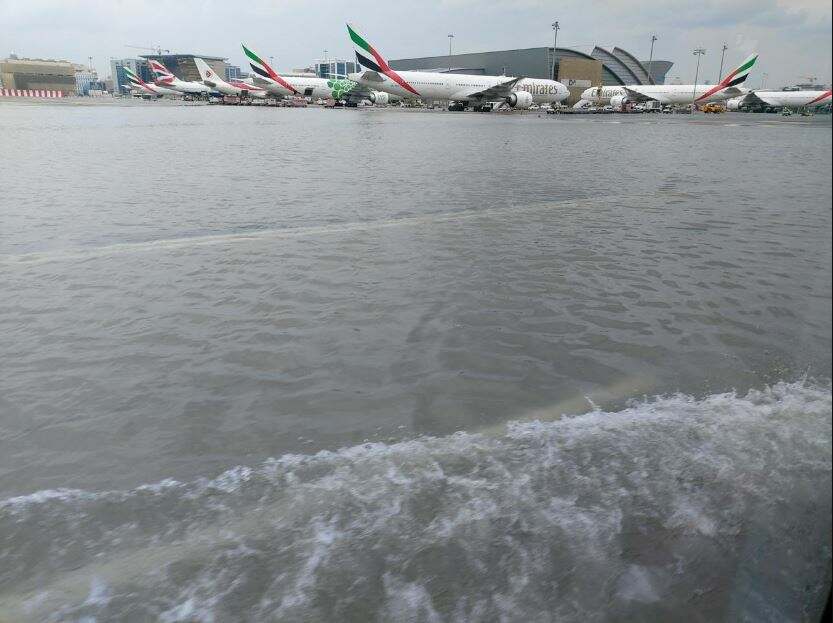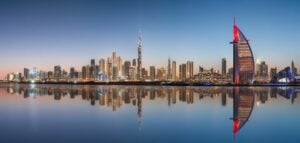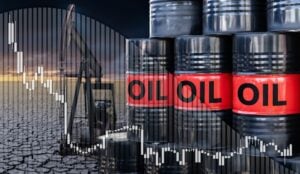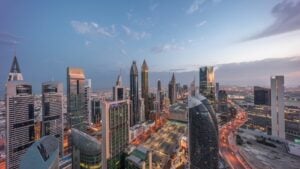
The Dubai Floods, April 2024
According to the Washington Post, United Arab Emirates, or DUBAI Wednesday saw an attempt to of extreme storm, Dubai floods and heavy rains which was UN predictable and following the most intense rainfall the arid nation has ever seen. The torrential downpour inundated Dubai International Airport and caused disruptions to flights through the biggest airport for international travel worldwide.
Officials are making efforts to provide food and beverages to affected passengers at Dubai Airport. Due to Dubai floods and the storm on Monday and Tuesday, some flights were unable to land at the usual terminal when leaving or arriving at the airport, and authorities are urging travelers to check the status of their flights online.
Tuesday’s rain and Dubai floods were described as “a historic weather event” by the state-run news agency WAM, surpassing “anything documented since the start of data collection in 1949.” That was before the discovery of crude oil in this country, which at the time was a part of the British protectorate known as the Crucial States.
Although the Dubai floods were severe in the UAE, rain also fell in Bahrain, Oman, Qatar, and Saudi Arabia.
Additionally, scientists claim that global climate change and Dubai floods are to blame for increasingly severe and frequent catastrophic storms, droughts, floods, and wildfires. Just last year, Dubai played host to the United Nations’ COP28 climate conferences. It has long been believed that life in the Middle East region is in danger due to rising temperatures and other repercussions of global warming.
The rain started late on Monday and, according to meteorological data gathered at Dubai International Airport, soaked the sands and roads of Dubai with about 20 millimeters (0.79 inches) of rain. Tuesday began at nine in the morning, and the storms got worse as the day went on, pouring more Dubai floods and hail on the already overburdened metropolis.
How have natural crises like the Dubai floods impacted the real estate industry?
One of the main draws for investors to the Emirate of Dubai is its selection of high-end real estate. Dubai, home to some of the world’s most well-known structures and landmarks, provides investors and locals with a daily luxury lifestyle that blends a family-friendly lifestyle with unbroken luxury.
But with all the natural crises like the Dubai floods that the world and the region have seen recently, people are starting to worry about what the future holds for real estate investment in Dubai. The city has experienced catastrophic natural disasters like the recent earthquake in Turkey and Syria, dust storms, torrential floods, and droughts.
And what might be the investors’ prospects?
Recent years have seen many natural crises like the Dubai floods, particularly with the recent earthquake that significantly impacted real estate markets, particularly in Dubai, where tourism plays a major role in the economy. Because of this, there have been numerous recent doubts about the real estate market’s future in Dubai.
Many Russian investors in Dubai real estate are those who made this decision. This is due to Dubai’s geographic location, which is remote from the Russian-Ukrainian conflict. Due to the sharp drop in real estate values following natural crises like the Dubai floods, Turkish property investors who had previously taken advantage of the country’s advantageous location and high property prices made an instant change.
Landlords and real estate investors have benefited from these changes in investor preferences, as their properties have grown in value and are currently more sought-after than before. Due to Dubai’s favorable geographic and political location, property prices and investment returns have also increased dramatically. For individuals searching for a strategically located city, the United Arab Emirates presents a haven in which to live and invest, having never seen any significant political unrest. Since Dubai has never had a significant natural disaster, investors are encouraged to purchase and maintain real estate.
Disasters can present chances for fresh initiatives and financial investments. For instance, Dubai witnessed a sharp rise in foreign investment from Japanese investors seeking to diversify their holdings away from the afflicted area following the 2011 earthquake and tsunami in Japan. The real estate industry in Dubai has benefited from the surge in new buildings and development brought about by this financial inflow.
However, Dubai and the surrounding region are resilient, and given the region’s long history of economic expansion and attracting foreign capital, the country’s real estate market is likely to expand despite the many challenges facing this area due to conflicts and natural disasters such as rain in Dubai and powerful storms.
Dubai has implemented several measures to ensure the resilience of its power grids during natural crises
These measures aim to minimize disruptions to the electricity supply and ensure the safety and well-being of its residents in natural crises like the Dubai floods. Here are some key initiatives taken by Dubai:
- Smart Grid Systems:
Dubai has implemented smart grid systems that integrate advanced communication and information technologies into the power grid infrastructure to resist any natural crises like the Dubai floods. These systems enable real-time monitoring, control, and optimization of electricity generation, distribution, and consumption.
- Infrastructure Planning and Design:
Dubai has invested in planning and designing robust infrastructure to ensure the resilience of its electricity grids. This includes the use of advanced technologies and smart grid systems that can detect and respond to emergency problems more efficiently to face any unexpected or emergency events such as Dubai floods, that caused disruption to government sectors for several days as a result of the force of the cyclone.
- Underground Power Cables:
Dubai has been actively underground its power cables to protect them from extreme weather events such as storms and hurricanes. Underground cables are less susceptible to damage caused by falling trees, high winds, and flooding like Dubai floods, ensuring a more resilient power grid.
- Emergency Response and Disaster Management:
Dubai has a well-established emergency response and disaster management system. This includes dedicated teams and resources to deal with power outages and restore electricity immediately during natural disasters. Coordination between various government agencies and utility providers ensures a rapid and effective response to the authority to reduce the magnitude of risks posed by environmental challenges that may face the region, such as Dubai floods.
To sum up, the importance of preparedness and resilience in the real estate industry has been highlighted despite natural crises like the recent Dubai floods and heavy rain. The electricity supplies, technology techniques, and infrastructure expenditures can assist reduce hazards and guarantee long-term sustainability, even though there may be an immediate impact on property values and investor trust. Dubai’s status as a leading worldwide destination for real estate development and investment may be maintained by tackling the challenges that are caused by global climate change.




